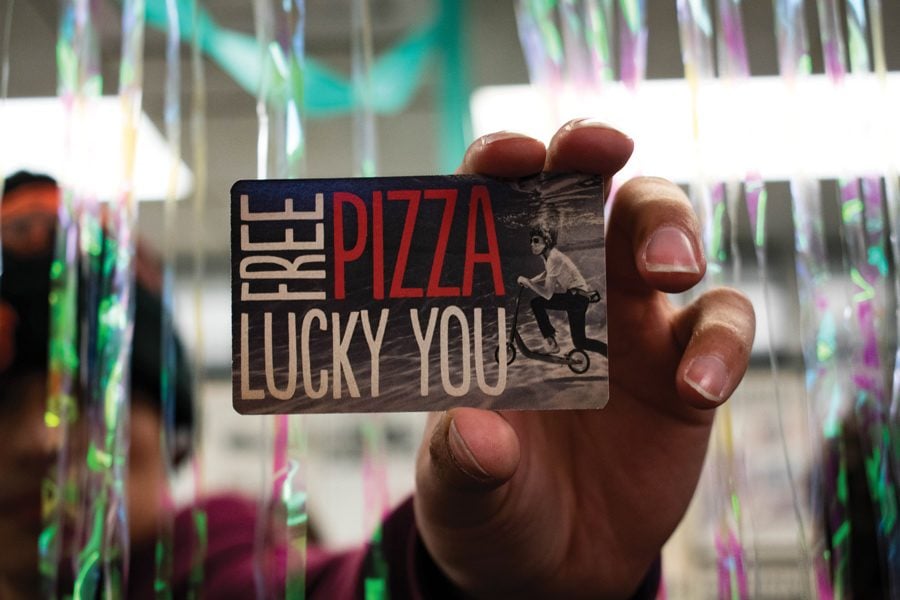From Belize to Belgium: The past, present and uncertain future of the Wildcat GeoGame
Daily File Photo by Alison Albeda
A coupon for a free Blaze Pizza. The Wildcat GeoGame is ending after this quarter because the game directors no longer have the funding to purchase the prize coupons.
March 6, 2019
It was a day that would go down in Northwestern history: On Jan. 13, the Wildcat GeoGame mixed up Belize and Belgium.
The game’s question for that day asked Northwestern students to identify Belize on a map, but players across campus were shocked to find that upon clicking the correct Central American country, they were met with a red thumbs-down icon and the devastating words, “You Missed it!” Instead, Belgium was mistakenly highlighted as the correct answer.
Emails were sent. Memes were posted. Hearts were broken.
The Wildcat GeoGame has come a long way since it was first floated as a concept in the fall of 2016, Medill Prof. Candy Lee said. In the game’s first quarter of operation, 142 people answered at least 30 daily geography questions correctly, winning free Blaze Pizzas. At the end of Fall Quarter 2018, the game had 1,221 winners and over 86,000 pageviews. So far this winter, it has amassed over 79,000 pageviews.
After noticing a lack of geography knowledge among students, Lee said she wanted to create a game that could both engage students and help them learn about the world.
Lee, who is also a member of The Daily’s governing board, Students Publishing Company, applied for a grant from Academic and Research Technologies, a department of Northwestern Information Technology, to jumpstart the project. Soon, she said, several departments and offices — from the Buffett Institute for Global Studies to the Office of the Provost — became involved, assisting her in building the game, testing prototypes and securing funding.
“This truly is a village,” Lee said. “I would never be able to do this without the group.”
In addition to providing an initial grant for the GeoGame, NUIT also helped create the digital framework for the project.
Rodolfo Vieira, developer lead in the Media and Design group at NUIT, said he provided guidance to student developers from the NUX Studio, who built most of the GeoGame’s design and technology components.
“This was a perfect application and game for them to work on,” he said. “We were lucky enough that we have very high talent in our student team, and they were able to turn this around in a very short amount of time.”
The team also brought on Kelsey Rydland, a geographic information systems and data analyst for Northwestern Libraries, to produce the game’s content. Rydland said he creates a bank of questions, which have gotten more challenging over the past three years.
“At the beginning, the game was really pretty basic, just like ‘Where is Denmark?’ or ‘Where is Brazil?’ and then we got feedback that people wanted the questions to be a little harder,” Rydland said. “So we started adding capitals, larger cities, things like that. And then we started adding some two-part questions as well.”
Rydland said he keeps his question bank in a Google Sheet, from which the game software pulls to create a daily question. Lee said she and Rydland play the game early each day to catch any mistakes.
Rydland said January’s Belize-Belgium mixup happened when he accidentally typed the wrong ISO country code into the spreadsheet — Belize’s is BZ, and Belgium’s is BE.
“I do remember one of the students, when we realized that there was a mistake with the Belize question, wrote back, ‘I can’t Belize this,’” he said, adding that because of the error, everyone who played the game that day got the question right.
Rydland said he didn’t realize how ingrained the game had become in the Northwestern community until he and Vieira looked at the answer data for that day and noticed that at a certain point, people began to answer Belgium because they had heard about the error. People weren’t just playing the game individually; they had created an “informal communication network” around it, Ryland said.
Lee said the success of the GeoGame is due to the collaboration across departments and schools.
“This was really a community-wide endeavor,” she said.
But Lee said issues with funding for the Blaze Pizza cards could mean an uncertain future for the GeoGame.
This quarter, the number of questions players have to answer correctly to receive the first Blaze Pizza card increased from 30 to 35, and the number of cards a player can receive was capped at two instead of three.
University-wide budget cuts made to alleviate the $94 million deficit have put financial strain on the offices and departments that originally contributed money to buy the cards. However, Lee attributes the change more to the steep increase in players than to any budget issues.
Lee said she thinks the game will be able to run next quarter but is unsure if it can continue into next year — and that the thousands of people who play the game not being able to learn about geography would be a “considerable loss to the community.”
“The fact is, we had a unique experiment that brought all of those things together,” Lee said. “And it’s very hard to bring it back, and it’s pretty inexpensive to keep it together.”
Email: [email protected]
Twitter: @alexpshorts
Related Stories:
— Online geography game returns after 31,000 interactions in first year
— University launches online geography game












